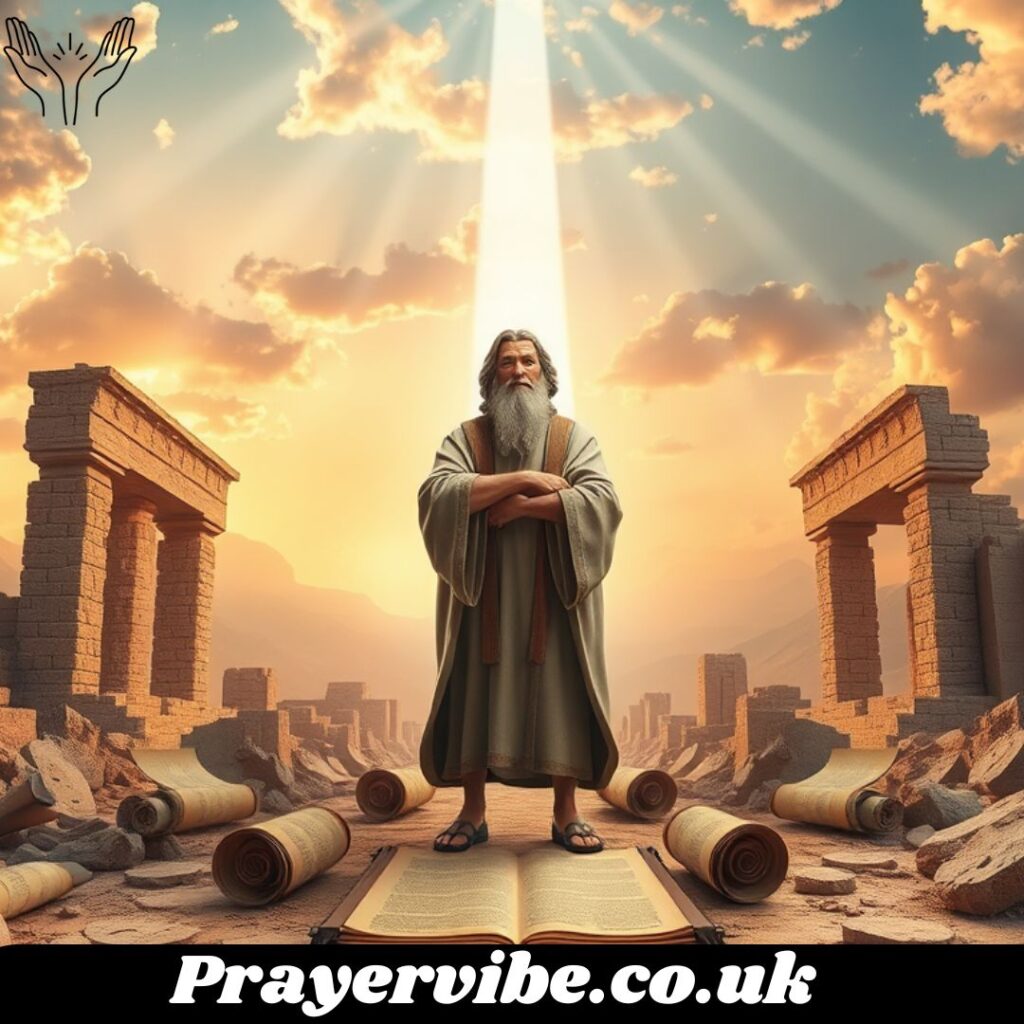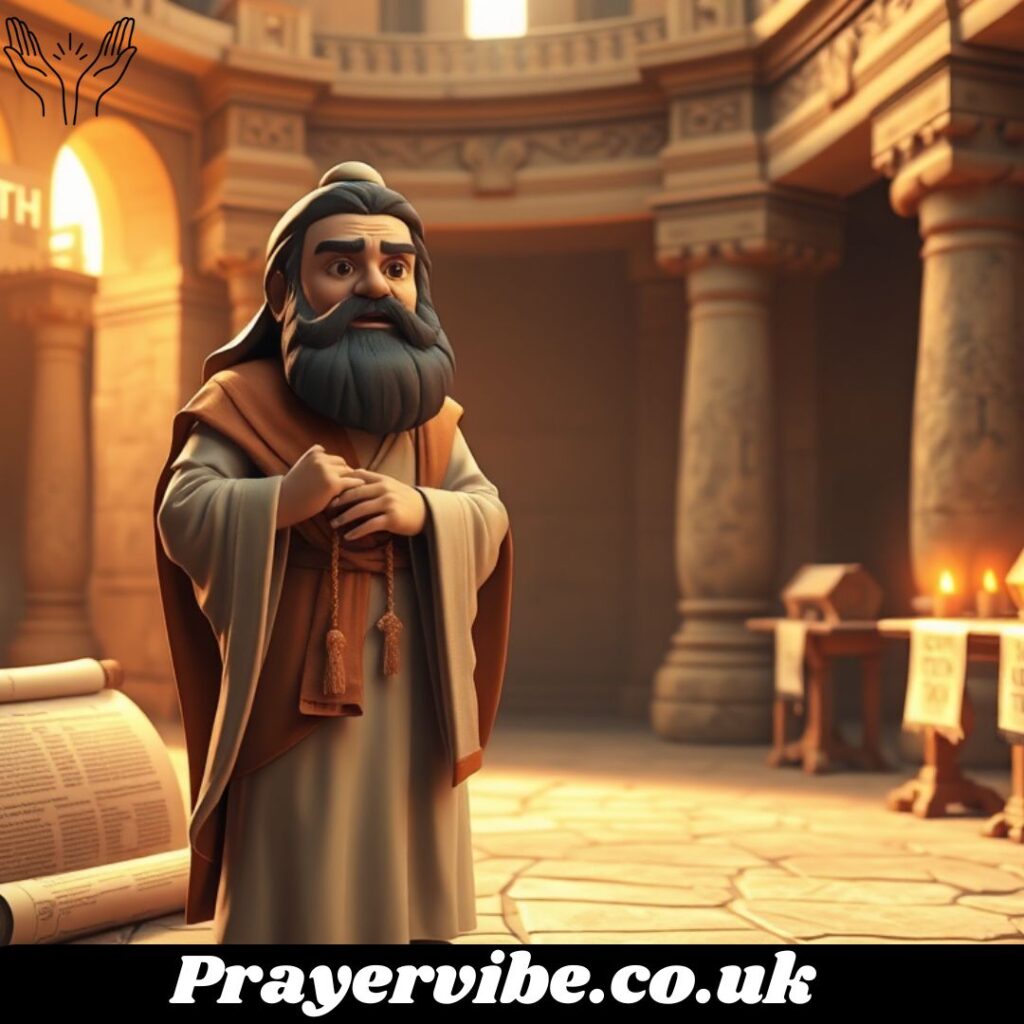Throughout the Bible, there are awe-inspiring moments when individuals had direct encounters with God — some face to face, others through visions, angels, or divine manifestations. These encounters left lasting impressions and revealed God’s glory, power, and love.
From Moses on the mountain 🏔️ to Isaiah in the temple 👑, each story teaches us more about God’s desire to connect with humanity. Let’s explore 15 amazing moments when people saw God in powerful and sometimes mysterious ways! 🔥🌈📖
🙏 Divine Prayer Generator
Select a prayer category to begin
Moses: The Friend of God 🔥⛰️
Moses is one of the most prominent figures in the Bible, and also one of the few who saw God physically. He had several encounters with God on Mount Sinai and in the tent of meeting, where he received the Ten Commandments, the Law, and the instructions for building the tabernacle. Exodus 33:11 tells us that “the Lord would speak to Moses face to face, as one speaks to a friend.” However, Moses was not satisfied with this level of intimacy. He wanted to see more of God’s glory. He asked God, “Now show me your glory” (Exodus 33:18).
God agreed to grant Moses’ request, but with a condition. He said, “You cannot see my face, for no one may see me and live” (Exodus 33:20). God explained that He would place Moses in a cleft of the rock and cover him with His hand until He passed by. Then He would remove His hand and let Moses see His back, but not His face (Exodus 33:21-23). This is what happened in Exodus 34:5-7, where we read that “the Lord came down in the cloud and stood there with him and proclaimed his name, the Lord. And he passed in front of Moses, proclaiming, ‘The Lord, the Lord, the compassionate and gracious God, slow to anger, abounding in love and faithfulness, maintaining love to thousands, and forgiving wickedness, rebellion and sin. Yet he does not leave the guilty unpunished; he punishes the children and their children for the sin of the parents to the third and fourth generation.'”
Moses’ encounter with God had a visible effect on him. His face was radiant because he had spoken with the Lord (Exodus 34:29). He had to wear a veil when he came down from the mountain and whenever he spoke to the Israelites, because they were afraid of his shining face (Exodus 34:30-35). Moses’ encounter with God also had a lasting impact on his relationship with God. He was known as the friend of God, who spoke to Him face to face (Deuteronomy 34:10; James 2:23).
What can we learn from Moses’ experience? We can learn the importance of obedience, humility, and intercession. Moses was obedient to God’s commands, even when they were difficult or dangerous. He was humble before God, acknowledging his own limitations and weaknesses. He was also an intercessor for the people of Israel, pleading with God to forgive them and spare them from His wrath. Moses’ example shows us how to draw near to God and enjoy His presence and favor.
Jacob: The Wrestler with God 🌙💪
Jacob was another person who saw God physically in the Bible. Jacob was the son of Isaac and Rebekah, and the twin brother of Esau. He was also a deceiver, who cheated his brother out of his birthright and his blessing. He fled from his home to escape Esau’s anger and went to his uncle Laban’s house. There he married Rachel and Leah, and worked for Laban for 20 years. He became wealthy and had many children, but he also had many troubles and conflicts with his uncle and his wives.
After 20 years, God told Jacob to return to his homeland and promised to be with him (Genesis 31:3). Jacob obeyed, but he was afraid of meeting his brother Esau, who was coming to meet him with 400 men. Jacob sent gifts and messengers ahead of him to appease Esau, and then he divided his family and his flocks into two groups, hoping that if Esau attacked one, the other could escape. He also prayed to God for protection and mercy, reminding Him of His promises (Genesis 32:9-12).
The night before he met Esau, Jacob was alone on the other side of the river Jabbok. There he had a mysterious encounter with a man who wrestled with him until daybreak. The man could not overpower Jacob, so he touched his hip and dislocated it. Then he asked Jacob to let him go, but Jacob refused. He said, “I will not let you go unless you bless me” (Genesis 32:26). The man asked him, “What is your name?” Jacob answered, “Jacob.” The man said, “Your name will no longer be Jacob, but Israel, because you have struggled with God and with humans and have overcome” (Genesis 32:27-28). Jacob realized that he had wrestled with God, and he named the place Peniel, meaning “face of God.” He said, “It is because I saw God face to face, and yet my life was spared” (Genesis 32:30).
Jacob’s encounter with God was a turning point in his life. He received a new name, a new identity, and a new blessing from God. He also received a new limp, a reminder of his weakness and dependence on God. He was no longer the deceiver, but the prince of God. He was no longer the fugitive, but the heir of the promise. He was no longer the schemer, but the worshiper of God.
What can we learn from Jacob’s experience? We can learn the need for repentance, surrender, and perseverance. Jacob had to repent of his sins and face his brother with honesty and humility. He had to surrender his will and his plans to God and trust in His grace and power. He had to persevere in his struggle with God and not give up until he received His blessing. Jacob’s example shows us how to wrestle with God and experience His transformation and favor.
Isaiah: The Prophet of God 👑✍️
Isaiah was one of the greatest prophets of God in the Bible, and he prophesied about the judgment and salvation of God for Judah, Israel, and the nations. He also foretold the coming of the Messiah, the Servant of the Lord, who would suffer and die for the sins of the people and bring everlasting peace and righteousness.
Isaiah had a vision of God in the year that King Uzziah died. He wrote:
“I saw the Lord, high and exalted, seated on a throne, and the train of his robe filled the temple. Above him were seraphim, each with six wings: with two wings they covered their faces, with two they covered their feet, and with two they were flying. And they were calling to one another: ‘Holy, holy, holy is the Lord Almighty; the whole earth is full of his glory.’ At the sound of their voices the doorposts and thresholds shook and the temple was filled with smoke” (Isaiah 6:1-4).
Isaiah’s reaction to seeing God was one of fear and awe. He said, “Woe to me! I am ruined! For I am a man of unclean lips, and I live among a people of unclean lips, and my eyes have seen the King, the Lord Almighty” (Isaiah 6:5). He realized his sinfulness and unworthiness in the presence of the holy God. He also recognized the sinfulness and rebellion of his people, who had turned away from God and His law.
But God did not leave Isaiah in his despair. He sent one of the seraphim to touch Isaiah’s mouth with a live coal from the altar, and said, “See, this has touched your lips; your guilt is taken away and your sin atoned for” (Isaiah 6:6-7). God forgave Isaiah’s sin and cleansed his mouth, preparing him for his prophetic ministry.
What can we learn from Isaiah’s experience? We can learn the awe of God’s holiness, the grace of God’s forgiveness, and the responsibility of God’s calling. Isaiah saw God as He is, holy and glorious, and he was humbled and convicted by His majesty. But God also showed him His mercy and love, and he was forgiven and cleansed by His grace. God also gave him His mission and message, and he was obedient and faithful to His calling. Isaiah’s example shows us how to respond to God’s revelation and commission.
Ezekiel: The Watchman of God 🌪️👁️

Ezekiel was another prophet of God in the Bible, and he prophesied to the exiles about the destruction of Jerusalem and the temple, the judgment and restoration of Israel, and the future glory of God’s kingdom.
Ezekiel had a vision of God by the Kebar River in the land of the Babylonians. He wrote:
“He saw the heavens opened and he saw visions of God. He saw a windstorm coming out of the north, an immense cloud with flashing lightning and surrounded by brilliant light. The center of the fire looked like glowing metal, and in the fire was what looked like four living creatures. Each of the creatures had four faces and four wings, and their legs were straight and their feet were like those of a calf and gleamed like burnished bronze. Under their wings on their four sides they had human hands. Their faces and wings looked like this: Each of the four had the face of a human being, and on the right side each had the face of a lion, and on the left the face of an ox; each also had the face of an eagle.” (Ezekiel 1:4-10).
Above the vault over their heads was what looked like a throne of lapis lazuli, and high above on the throne was a figure like that of a man. From what appeared to be his waist up he looked like glowing metal, as if full of fire, and from there down he looked like fire; and brilliant light surrounded him. Like the appearance of a rainbow in the clouds on a rainy day, so was the radiance around him. This was the appearance of the likeness of the glory of the Lord. When Ezekiel saw it, he fell facedown, and heard the voice of one speaking (Ezekiel 1:26-28).
Ezekiel’s vision of God was full of symbolism and mystery. He saw God as the King of the universe, seated on His throne, surrounded by His glory and His angels. He saw God as the Creator and Sustainer of all things, who controls the movements of the creatures and the wheels. He saw God as the Judge and the Warrior, who speaks with authority and power, and who executes His wrath and His will.
What can we learn from Ezekiel’s experience? We can learn the majesty of God’s glory, the sovereignty of God’s plan, and the obedience of God’s servant. Ezekiel saw God as He is, glorious and awesome, and he was overwhelmed and astonished by His splendor. But God also revealed to him His purpose and His promise, and he was enlightened and encouraged by His vision. God also entrusted him with His mission and His message, and he was faithful and courageous to His calling. Ezekiel’s example shows us how to behold God’s glory and obey His voice.
Daniel: The Beloved of God 📚🔮
Daniel was another prophet of God in the Bible, and he served in the courts of Nebuchadnezzar, Belshazzar, Darius, and Cyrus, and gained favor and influence with them. He also interpreted dreams and visions, and received revelations from God about the future of God’s people and His kingdom.
Daniel’s vision of God happened in the first year of Belshazzar king of Babylon. He saw a night vision in which he saw the Ancient of Days and the Son of Man. He wrote, “As I looked, thrones were set in place, and the Ancient of Days took his seat. His clothing was as white as snow; the hair of his head was white like wool. His throne was flaming with fire, and its wheels were all ablaze. A river of fire was flowing, coming out from before him. Thousands upon thousands attended him; ten thousand times ten thousand stood before him. The court was seated, and the books were opened. … In my vision at night I looked, and there before me was one like a son of man, coming with the clouds of heaven. He approached the Ancient of Days and was led into his presence. He was given authority, glory and sovereign power; all nations and peoples of every language worshiped him. His dominion is an everlasting dominion that will not pass away, and his kingdom is one that will never be destroyed” (Daniel 7:9-10, 13-14).
Daniel’s vision of God revealed the future of God’s kingdom and judgment. He saw the Ancient of Days, who is God the Father, the eternal and sovereign ruler of the universe. He saw the Son of Man, who is Jesus Christ, the Messiah and the Son of God, who came from heaven to earth and will return in glory and power. He saw the books, which are the records of the deeds and destinies of all people. He saw the thrones, which are the seats of authority and justice. He saw the fire, which is the symbol of God’s holiness and wrath. He saw the beasts, which are the empires and rulers that oppose God and His people. He saw the saints, who are the faithful and persecuted followers of God and His Son.
What can we learn from Daniel’s experience? We can learn the wisdom of God’s timing, the justice of God’s rule, and the trust of God’s people. Daniel saw God as He is, the Ancient of Days and the Son of Man, and he was amazed and awed by His majesty. But God also showed him His purpose and His promise, and he was enlightened and assured by His vision. God also gave him His wisdom and His word, and he was faithful and diligent to His calling. Daniel’s example shows us how to seek God’s kingdom and obey His will.
Stephen: The Martyr of God 👑🔍
Stephen was one of the first followers of Jesus Christ in the Bible, and he was one of the seven men who were chosen by the apostles to serve the widows and the needy in the church.
He was also filled with the Holy Spirit and with wisdom, and he performed great wonders and signs among the people. He preached the gospel boldly and witnessed to the Jews about Jesus as the Messiah, but they opposed him and brought him before the Sanhedrin on false charges of blasphemy. There he gave a powerful speech about God’s history with Israel and their rejection of His prophets and His Son. This made them furious, and they dragged him out of the city to stone him to death.
Before he died, Stephen had a vision of God. He wrote, “But Stephen, full of the Holy Spirit, looked up to heaven and saw the glory of God, and Jesus standing at the right hand of God. ‘Look,’ he said, ‘I see heaven open and the Son of Man standing at the right hand of God'” (Acts 7:55-56). He saw God as He is, the Father and the Son, the Creator and the Redeemer, the Judge and the Advocate. He saw Jesus as He is, the Son of Man and the Son of God, the Messiah and the Lord, the Sufferer and the Victor.
Stephen’s vision of God gave him courage and grace to face his death. He did not fear his persecutors, but he testified to them about God’s history and plan, and about Jesus’ life and work. He did not hate his killers, but he prayed for them and forgave them. He said, “Lord, do not hold this sin against them” (Acts 7:60). He did not despair in his pain, but he entrusted his spirit to God. He said, “Lord Jesus, receive my spirit” (Acts 7:59).
What can we learn from Stephen’s experience? We can learn the power of God’s presence, the love of God’s Son, and the witness of God’s Spirit. Stephen saw God as He is, the Father and the Son, and he was comforted and strengthened by His presence. But God also showed him His love and His grace, and he was transformed and empowered by His Son. God also gave him His words and His signs, and he was filled and led by His Spirit. Stephen’s example shows us how to follow God’s Son and glorify His name.
Paul: The Apostle of God ⚡🔄
Paul was one of the most influential followers of Jesus Christ in the Bible, and he was originally a Pharisee, a zealous persecutor of the church, and a witness of Stephen’s martyrdom. He was also a Roman citizen, a tentmaker, and a scholar. He became a Christian, an apostle, a missionary, and a writer of many letters. He traveled throughout the Roman empire, preaching the gospel, planting churches, and facing many hardships and dangers.
Paul’s vision of God happened on the road to Damascus. He was on his way to arrest and imprison the Christians in Damascus, when he saw a bright light from heaven and heard a voice saying, “Saul, Saul, why do you persecute me?” He asked, “Who are you, Lord?” The voice said, “I am Jesus, whom you are persecuting. Now get up and go into the city, and you will be told what you must do” (Acts 9:1-6; 22:6-10; 26:12-18). He saw God as He is, Jesus Christ, the risen and exalted Lord, who identifies with His people and confronts His enemies. He saw Jesus as He is, the Savior and the Judge, who shows mercy and grace, and who demands repentance and obedience.
Paul’s vision of God changed his life completely. He was blind for three days, and he did not eat or drink anything. He prayed and waited for God’s guidance. Then God sent Ananias to him, who laid his hands on him and said, “Brother Saul, the Lord—Jesus, who appeared to you on the road as you were coming here—has sent me so that you may see again and be filled with the Holy Spirit” (Acts 9:17). Immediately, something like scales fell from his eyes, and he could see again. He got up and was baptized, and then he began to preach that Jesus is the Son of God (Acts 9:18-20).
What can we learn from Paul’s experience? We can learn the mercy of God’s call, the truth of God’s gospel, and the strength of God’s grace. Paul saw God as He is, Jesus Christ, the Lord and the Savior, and he was humbled and amazed by His mercy. But God also showed him His truth and His gospel, and he was enlightened and empowered by His revelation. God also gave him His grace and His power, and he was comforted and strengthened by His presence. Paul’s example shows us how to follow God’s Son and proclaim His name.
John: The Beloved of God 📜🌟
John was one of the closest followers of Jesus Christ in the Bible, and he was one of the twelve apostles, the son of Zebedee and the brother of James. He was also a fisherman, a disciple, and a friend of Jesus. He wrote the fourth gospel, three letters, and the book of Revelation. He was the only apostle who did not die a martyr’s death, but lived to old age and died in Ephesus.
John’s vision of God happened on the island of Patmos, where he was exiled for his testimony of Jesus. He saw the Lord Jesus Christ in His glory and majesty, and received from Him the revelation of the things that are and the things that will be. He wrote, “On the Lord’s Day I was in the Spirit, and I heard behind me a loud voice like a trumpet, which said: ‘Write on a scroll what you see and send it to the seven churches: to Ephesus, Smyrna, Pergamum, Thyatira, Sardis, Philadelphia and Laodicea.’ I turned around to see the voice that was speaking to me. And when I turned I saw seven golden lampstands, and among the lampstands was someone like a son of man, dressed in a robe reaching down to his feet and with a golden sash around his chest. The hair on his head was white like wool, as white as snow, and his eyes were like blazing fire. His feet were like bronze glowing in a furnace, and his voice was like the sound of rushing waters. In his right hand he held seven stars, and coming out of his mouth was a sharp, double-edged sword. His face was like the sun shining in all its brilliance. When I saw him, I fell at his feet as though dead. Then he placed his right hand on me and said: ‘Do not be afraid. I am the First and the Last. I am the Living One; I was dead, and now look, I am alive for ever and ever! And I hold the keys of death and Hades. Write, therefore, what you have seen, what is now and what will take place later'” (Revelation 1:10-19).
John’s vision of God revealed the past, present, and future of God’s work. He saw Jesus Christ, the Son of God and the Son of Man, the Alpha and the Omega, the Lion and the Lamb, the King and the Priest, the Bridegroom and the Judge.
What can we learn from John’s experience? We can learn the beauty of God’s person, the victory of God’s Lamb, and the hope of God’s kingdom. John saw God as He is, the Father and the Son, and he was captivated and amazed by His beauty. But God also showed him His victory and His kingdom, and he was enlightened and assured by His revelation. God also gave him His words and His signs, and he was faithful and obedient to His calling. John’s example shows us how to love God’s Son and await His return.
Abraham: The Friend of God 🏕️🌠
Abraham was the father of the faithful, and he received the covenant and the promise from God. He left his homeland of Ur to follow God’s call to the land of Canaan. He had several encounters with God, but one of the most significant was when God appeared to him by the oaks of Mamre.
“The LORD appeared to Abraham near the great trees of Mamre while he was sitting at the entrance to his tent in the heat of the day. Abraham looked up and saw three men standing nearby. When he saw them, he hurried from the entrance of his tent to meet them and bowed low to the ground” (Genesis 18:1-2).
Abraham showed hospitality to these visitors, not fully recognizing at first that he was entertaining the Lord himself along with two angels. During this visit, God confirmed that Sarah would have a son within a year, and revealed His plans regarding Sodom and Gomorrah. Abraham boldly negotiated with the Lord, showing the intimate relationship he had developed with God.
What can we learn from Abraham’s experience? We can learn about divine hospitality, intercessory prayer, and the intimacy that comes from walking with God in faith. Abraham’s example shows us how faithful obedience leads to friendship with God.
Gideon: The Reluctant Warrior 🔥⚔️
Gideon was an unlikely hero whom God raised up to deliver Israel from the oppression of the Midianites. His encounter with God came when he was threshing wheat in a winepress, hiding from the Midianites.
“The angel of the LORD came and sat down under the oak in Ophrah that belonged to Joash the Abiezrite, where his son Gideon was threshing wheat in a winepress to keep it from the Midianites. When the angel of the LORD appeared to Gideon, he said, ‘The LORD is with you, mighty warrior'” (Judges 6:11-12).
Gideon didn’t immediately recognize that he was speaking with the Lord. He questioned why God had abandoned Israel and doubted his own ability to save his people. To confirm the divine nature of his visitor, Gideon prepared an offering, which the angel consumed with fire from a rock. It was then that “Gideon realized that it was the angel of the LORD, [and] he exclaimed, ‘Alas, Sovereign LORD! I have seen the angel of the LORD face to face!'” (Judges 6:22).
What can we learn from Gideon’s experience? We can learn about God’s patience with our doubts, His power to work through unlikely vessels, and His willingness to provide confirmation to strengthen our faith. Gideon’s example shows us that God can use even the most insecure among us for His glory.
Manoah and His Wife: The Parents of Samson 👪🙏
Manoah and his wife were the parents of Samson, one of Israel’s judges. They had been unable to have children until the angel of the Lord appeared to Manoah’s wife with a promise.
“A man of God came to me. He looked like an angel of God, very awesome. I didn’t ask him where he came from, and he didn’t tell me his name… The woman gave birth to a boy and named him Samson” (Judges 13:6, 24).
When Manoah prayed that the messenger would return, God granted his request. The angel appeared again and repeated the instructions about the child who would be born. Manoah prepared a young goat as an offering, and when the flame blazed up from the altar toward heaven, the angel of the Lord ascended in the flame. “Then Manoah realized that it was the angel of the LORD. ‘We are doomed to die!’ he said to his wife. ‘We have seen God!'” (Judges 13:21-22).
What can we learn from their experience? We can learn about God’s attention to families, His detailed care for our lives, and the importance of obedience to His specific instructions. Their example shows us that divine encounters often come in the context of ordinary life and may bring extraordinary responsibilities.
Job: The Tested Servant 🌪️💬
Job was a righteous man who suffered tremendous loss and pain. After enduring the well-intentioned but misguided counsel of his friends, Job finally heard directly from God, who spoke to him out of a whirlwind.
“Then the LORD spoke to Job out of the storm. He said: ‘Who is this that obscures my plans with words without knowledge? Brace yourself like a man; I will question you, and you shall answer me'” (Job 38:1-3).
God proceeded to ask Job a series of questions about creation and providence that Job could not answer. This divine encounter completely transformed Job’s perspective. He responded, “My ears had heard of you but now my eyes have seen you. Therefore I despise myself and repent in dust and ashes” (Job 42:5-6).
What can we learn from Job’s experience? We can learn about God’s sovereignty over suffering, the limitations of human understanding, and the transformative power of directly encountering God. Job’s example shows us that divine revelation often comes after seasons of hardship and questioning.
Micaiah: The Truthful Prophet 👑🔮

Micaiah was a prophet during the time of King Ahab of Israel. While other prophets were telling the king what he wanted to hear, Micaiah remained faithful to speak only what God revealed to him, even though it meant persecution.
Micaiah described his vision of God: “I saw the LORD sitting on his throne with all the multitudes of heaven standing around him on his right and on his left” (1 Kings 22:19). In this vision, God was deliberating with the heavenly host about how to deal with wicked King Ahab.
What can we learn from Micaiah’s experience? We can learn about the courage to speak God’s truth regardless of consequences, God’s sovereignty over earthly kingdoms, and the reality of heavenly councils. Micaiah’s example shows us that faithfulness to God’s word may bring opposition from those in power.
Amos: The Shepherd Prophet 🐑⚖️
Amos was a shepherd from Tekoa whom God called to prophesy to the northern kingdom of Israel during a time of prosperity and spiritual decay. His visions of God revealed divine judgment.
“I saw the Lord standing by the altar, and he said: ‘Strike the tops of the pillars so that the thresholds shake. Bring them down on the heads of all the people; those who are left I will kill with the sword'” (Amos 9:1).
Amos saw the Lord as the sovereign judge, ready to execute judgment on Israel for their injustice, idolatry, and oppression of the poor. Yet even in judgment, God promised eventual restoration.
What can we learn from Amos’ experience? We can learn about God’s passionate concern for justice, His hatred of religious hypocrisy, and His ultimate plan for restoration. Amos shows us that God often uses ordinary people from humble backgrounds to deliver extraordinary messages.
Peter: The Rock of the Church 🗻🔑
Peter was one of Jesus’ closest disciples who later became a leader in the early church. He witnessed the transfiguration, where he saw Jesus’ divine glory revealed.
“Jesus took with him Peter, James and John the brother of James, and led them up a high mountain by themselves. There he was transfigured before them. His face shone like the sun, and his clothes became as white as the light. Just then there appeared before them Moses and Elijah, talking with Jesus” (Matthew 17:1-3).
In this extraordinary moment, Peter saw the glory of Christ unveiled, confirming Jesus’ divinity. Peter later wrote about this experience: “We did not follow cleverly devised stories when we told you about the coming of our Lord Jesus Christ in power, but we were eyewitnesses of his majesty” (2 Peter 1:16).
What can we learn from Peter’s experience? We can learn about Christ’s hidden glory, the connection between the Old and New Covenants (represented by Moses and Elijah), and the importance of listening to Jesus above all others. Peter’s example shows us that even momentary glimpses of divine glory can sustain faith through difficult times.
Frequently Asked Questions
Can humans actually see God face to face?
The Bible indicates that no one can see God’s full glory and live (Exodus 33:20), yet many biblical figures experienced partial or veiled revelations of God.
Did these people see God the Father or Jesus?
Most Old Testament appearances were likely theophanies (God appearing in a form humans could perceive) or the pre-incarnate Christ. New Testament visions typically involved Jesus in His glorified state.
Why doesn’t God appear visibly to people today?
God primarily reveals Himself today through Scripture, prayer, and the person of Jesus Christ. As Hebrews 1:1-2 states, God has spoken ultimately through His Son.
What’s the difference between a vision and a physical appearance of God?
Visions often occurred in altered states of consciousness, while physical appearances seemed to happen in normal waking reality, though both were equally real divine encounters.
How do we know these encounters weren’t just hallucinations?
The life-transforming effects, consistent character of God revealed, and fulfillment of prophecies given during these encounters suggest their authenticity.

Daniel Miller is a passionate writer, SEO expert, and blogger, specializing in Bible verses, prayers, and faith-based content at PrayerVibe.







